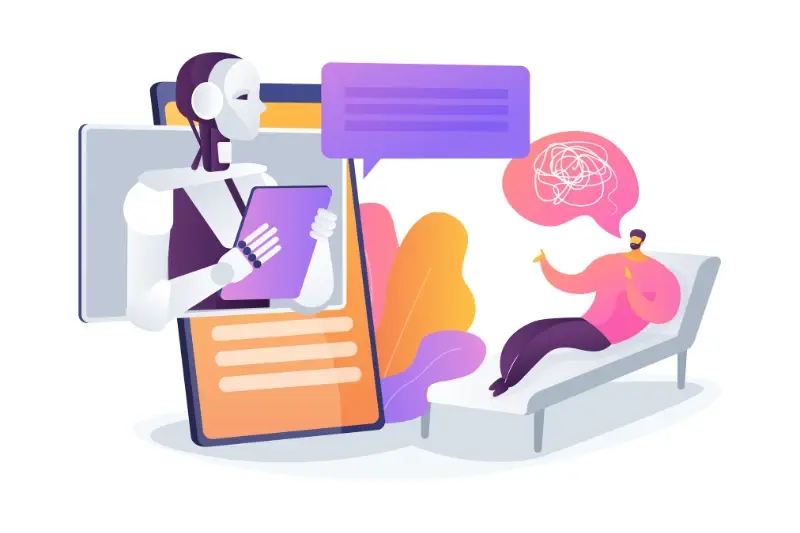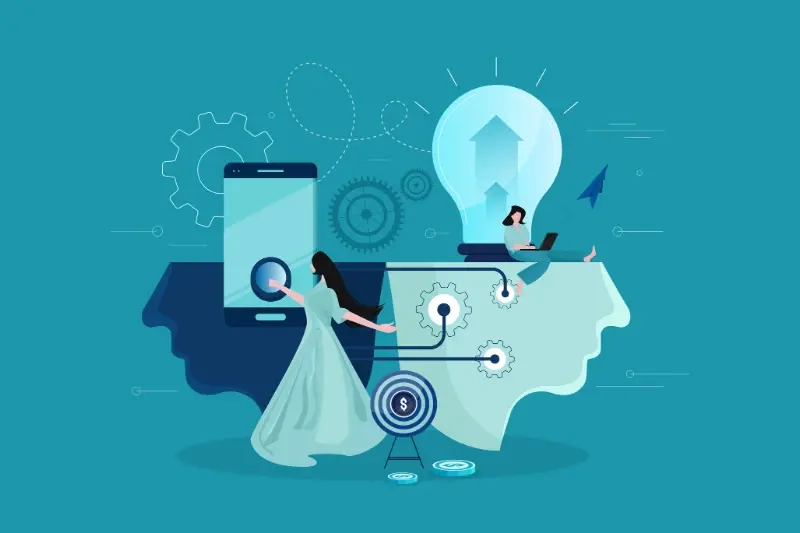How to Build AI Powered Apps With Psychological Insights
I've been building mobile apps for over eight years now, and I can tell you that artificial intelligence has completely changed how we think about mobile app development. Not too long ago, apps were pretty simple—they did what you told them to do and nothing more. But now? Now we can create AI apps that actually understand people and get smarter the more they're used.
The really exciting part isn't just the artificial intelligence itself—it's what happens when you combine AI with an understanding of how people think and behave. When you know why someone taps a button or abandons a screen, you can build intelligent app design that responds to those patterns. It's like having a conversation with your users, except the app is doing the listening and learning.
The best AI-powered apps don't just process data—they understand the human behind the screen
What I love about this approach is that it makes apps feel more personal without being creepy about it. Users get exactly what they need, when they need it, because the app has learned their habits and preferences. And from a development perspective, it opens up possibilities we could only dream about a few years ago. Ready to explore how psychology and AI can transform your next mobile app project?
Understanding AI and Psychology in Mobile Apps
Right, let's get straight to the point—AI and psychology might sound like two completely different things, but they work together brilliantly in mobile apps. I've watched this combination transform how people interact with their phones over the years, and honestly, it's quite remarkable when you see it done properly.
Think about it this way: psychology is all about understanding how people think, feel, and behave. AI is about making computers smart enough to learn and respond. When you put them together in a mobile app, you get something that can actually understand what users want—sometimes before they even know it themselves. If you're curious about some excellent examples of this in action, check out these amazing AI apps for Android and iOS that showcase the potential of this approach.
What Makes This Combination So Powerful?
The magic happens when AI systems learn from user behaviour patterns. Every tap, swipe, and pause tells a story about what someone likes or dislikes. Psychology gives us the framework to interpret these actions; AI gives us the tools to respond to them automatically.
For example, if someone always skips workout reminders on Monday mornings but responds well to them on Wednesday evenings, an AI-powered fitness app can learn this pattern and adjust accordingly. It's not mind-reading—it's pattern recognition combined with psychological insights about motivation and timing.
This approach makes apps feel more personal and helpful rather than annoying or pushy, which is exactly what we want to achieve.
The Science Behind User Behaviour
Right, let's talk about what actually makes people tick when they're using mobile apps. After years of watching people interact with the apps we've built, I can tell you that understanding user behaviour isn't just helpful—it's absolutely necessary for creating AI apps that people actually want to use.
The human brain processes information in predictable patterns, and this is where psychology meets mobile app development. When someone opens your app, their brain is making split-second decisions about whether to stay or leave. We're talking milliseconds here! Users scan screens in an F-pattern, look for familiar icons, and expect certain actions to happen when they tap buttons. If your AI features don't align with these natural behaviours, people will get confused and frustrated.
Key Psychological Triggers in AI Apps
There are specific psychological principles that work brilliantly in intelligent app design. These aren't tricks or manipulation—they're just how our brains naturally work:
- Pattern recognition: People love when apps learn their habits and predict what they need
- Instant gratification: AI features that provide immediate value get used more often
- Social proof: Showing how others benefit from AI features builds trust
- Loss aversion: People fear missing out on personalised recommendations
Start collecting user behaviour data from day one. The more you understand how people actually use your app (not how you think they use it), the better your AI features can adapt to their real needs.
The beautiful thing about combining artificial intelligence with psychology is that your app gets smarter about human behaviour over time, creating a feedback loop that benefits everyone. This is exactly why app development should start and end with your customer in mind.
Planning Your AI-Powered App Strategy
Right, let's talk strategy—because jumping into AI development without a proper plan is like trying to build a house without blueprints. I've watched countless clients get excited about AI features and rush straight into development, only to realise they've built something nobody actually wants to use.
The first question you need to ask yourself is this: what specific problem are you solving with AI? Not just "making things smarter" or "improving user experience"—I mean the exact pain point your users face. Are they struggling to find relevant content? Do they abandon tasks because the interface is too complicated? Are they making poor decisions because they lack information? If you're just starting out, you might want to read about turning your app idea into reality before diving into AI features.
Key Areas to Focus On
- User behaviour patterns you want to predict or influence
- Data you can collect ethically and legally
- Psychological triggers that align with your app's purpose
- Technical limitations of your target devices
- Budget for ongoing AI model training and updates
Here's something most people don't consider: AI features need feeding. They require constant data, regular updates, and ongoing maintenance. If you can't commit to nurturing your AI components, they'll become less effective over time—and users will notice.
Designing Intelligent User Interfaces
Right, let's talk about the actual design bit—the part where your AI-powered app starts to feel magical rather than mechanical. I've worked on enough mobile app development projects to know that getting the interface right can make or break your artificial intelligence features. People don't want to feel like they're talking to a robot; they want something that just works naturally.
The trick with intelligent app design is keeping things simple on the surface whilst all the clever stuff happens behind the scenes. Your users shouldn't need to understand machine learning algorithms—they just want their app to get better at helping them. Think predictive text that actually predicts what you're typing, or a fitness app that suggests workouts based on how tired you seemed yesterday.
Making AI Feel Human
This is where psychology really comes into play. Users need to trust your AI, and trust builds slowly. Start with small, helpful suggestions rather than trying to revolutionise their entire experience on day one. Show your working too—if your app recommends something, give a brief explanation why.
The best AI interfaces are the ones users don't even notice are powered by artificial intelligence—they just feel intuitive and helpful
I always tell my team that good AI design feels like having a really attentive assistant rather than a show-off computer. It learns your preferences quietly, adapts without fanfare, and gets things right more often than wrong. You can learn a lot from studying what successful app development companies do to create these seamless experiences.
Building AI Features That Learn From Users
Right, here's where things get properly interesting—and where I see most people get a bit overwhelmed. Building AI that actually learns from your users isn't about creating some super-intelligent robot; it's about collecting the right data and making smart decisions with it. Think of it like this: every tap, swipe, and pause tells you something about what your users want.
Start Small and Build Smart
I always tell my clients to begin with one simple learning feature. Maybe it's remembering which content users spend most time reading, or noticing when they skip certain steps in your app. The key is picking something that directly improves their experience—not just something that sounds clever at a meeting!
Your AI doesn't need to be perfect from day one. In fact, it shouldn't be. The best learning systems I've worked on started basic and got smarter as more people used them. We'd track user patterns, test different responses, and gradually improve the recommendations.
Privacy Comes First
Here's something that keeps me awake at night sometimes—making sure we're handling user data responsibly. Learning from users means collecting their behaviour data, but you must be transparent about what you're doing with it. Always ask permission; always explain the benefit they'll get in return. Trust me, users can tell when you're being sneaky about data collection, and they won't stand for it.
Testing Your App with Real People
Here's the thing about AI-powered apps—they can be brilliant at predicting what users might do, but they're rubbish at telling you what users actually think. That's where real people come in. I've lost count of how many times I've watched a user completely ignore a feature we thought was genius, or use something in a way we never expected.
Start small with your testing. Find five to ten people who match your target audience and watch them use your app without any guidance. Don't jump in to help when they get stuck—that's the whole point. You want to see where they struggle, what confuses them, and what makes them smile. The AI features you've built need to feel natural, not like they'm battling against a robot. This kind of user feedback can also help you understand how your app development projects can improve customer service.
Record these sessions if possible—you'll spot things you missed the first time around, and patterns will emerge across different users.
Pay special attention to how people react to your AI recommendations and personalised content. Do they trust them? Do they understand why the app is suggesting certain things? If your intelligent features feel creepy or confusing, you've got work to do. The best AI in mobile app development feels invisible to users—it just works, making their experience better without them having to think about it.
Making Your App Smarter Over Time
Here's the thing about AI—it gets better when it has more data to work with. Your app won't be perfect on day one, and that's absolutely fine. What matters is building systems that learn and improve as people use your app. I've worked on apps that started quite basic but became incredibly smart after a few months of real user interactions.
Collecting the Right Data
You need to track how people actually use your app, not just what you think they'll do. Look at which features get ignored, where people get stuck, and what makes them come back. But don't go overboard—collecting every single tap and swipe will just create noise. Focus on the interactions that tell you something meaningful about user behaviour.
Making Smart Updates
The best AI-powered apps update their intelligence quietly in the background. Users shouldn't notice the mechanics, just that the app seems to understand them better over time. Maybe your recommendation system gets more accurate or your interface adapts to their preferences. Small improvements compound into something really powerful.
Remember, building an AI-powered app is more like growing a garden than constructing a building—it needs constant attention and care to flourish.
Conclusion
Building AI-powered apps with psychological insights isn't rocket science—but it does require patience and a willingness to learn from your users. I've watched countless developers rush into adding AI features without really understanding why they're doing it, and trust me, it shows in the final product. The apps that succeed are the ones where the AI feels natural, where it genuinely helps people rather than just showing off fancy technology.
The psychology bit is what makes all the difference though. You can have the smartest AI in the world, but if it doesn't understand how people actually think and behave, you're wasting your time. I've seen apps with brilliant AI that nobody wanted to use because they felt cold or confusing. On the flip side, simple AI that taps into basic human psychology—like the need for recognition or the fear of missing out—can be incredibly powerful.
Your mobile app development journey doesn't end when you launch either. The best AI apps are the ones that keep learning and improving; they adapt to their users over time and become more useful with each interaction. That's the real magic of combining artificial intelligence with psychological insights—you create something that genuinely gets better at helping people live their lives.
Share this
Subscribe To Our Blog
You May Also Like
These Related Stories

How Expectation Mismatches Destroy App User Satisfaction

AI Meets Psychology: Next-Gen Mobile App Development





